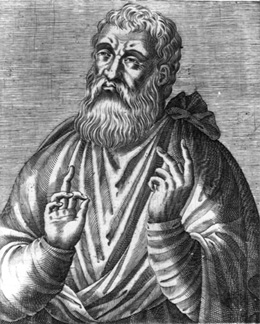Difference between revisions of "Justin Martyr"
Graham grove (talk | contribs) (rearranging format slightly) |
(→Life) |
||
| Line 11: | Line 11: | ||
==Life== | ==Life== | ||
| − | Most of what is known about the life of Justin Martyr comes from his own writings. He was born at [[Flavia Neapolis]] (modern [[Nablus]]) in [[Palestine]]. The city had been founded by [[Vespasian]] in the aftermath of the destruction of [[Jerusalem]] in [[70 AD]]. According to church tradition Justin suffered martyrdom at [[Rome]] under Marcus Aurelius when Rusticus was prefect of the city (between [[162 AD|162]] and [[168 AD|168]]). He calls himself a Samaritan, but his father and grandfather were probably Greek or Roman, and he was brought up a [[pagan]]. It seems that he had property, studied philosophy, converted to [[Christianity]], and devoted the rest of his life to teaching what he considered the true philosophy, still wearing his philosopher's gown to indicate that he had attained the truth. He probably travelled widely and ultimately settled in Rome as a Christian teacher. | + | Most of what is known about the life of Justin Martyr comes from his own writings. He was born at [[Flavia Neapolis]] (modern [[Nablus]]) in [[Palestine]]. The city had been founded by [[Vespasian]] in the aftermath of the destruction of [[Jerusalem]] in [[70 AD]]. According to church tradition Justin suffered martyrdom at [[Rome]] under Marcus Aurelius when Rusticus was prefect of the city (between [[162 AD|162]] and [[168 AD|168]]). He calls himself a Samaritan, but his father and grandfather were probably Greek or Roman, and he was brought up a [[pagan]]. It seems that he had property, studied philosophy, converted to [[Christianity]], and devoted the rest of his life to teaching what he considered the true philosophy, still wearing his philosopher's gown to indicate that he had attained the truth. He probably travelled widely and ultimately settled in Rome as a Christian teacher. While he was at Rome, he debated opponents of his belief, such as Crescens the Cynic. He was later martyred in 165 A.D. for his no compromise faith in Christianity. |
==Writings== | ==Writings== | ||
Revision as of 22:44, 21 January 2008
| Justin Martyr | |
| RELATED TOPICS | |
| SERMONS, ESSAYS AND OPINIONS |
|
| CONTENTS | Contents |
Justin Martyr (Justin of Caesarea) was an early Christian apologist. His works represent the earliest surviving Christian apologies of notable size. He lived from around 100 AD to 165 AD.
Life
Most of what is known about the life of Justin Martyr comes from his own writings. He was born at Flavia Neapolis (modern Nablus) in Palestine. The city had been founded by Vespasian in the aftermath of the destruction of Jerusalem in 70 AD. According to church tradition Justin suffered martyrdom at Rome under Marcus Aurelius when Rusticus was prefect of the city (between 162 and 168). He calls himself a Samaritan, but his father and grandfather were probably Greek or Roman, and he was brought up a pagan. It seems that he had property, studied philosophy, converted to Christianity, and devoted the rest of his life to teaching what he considered the true philosophy, still wearing his philosopher's gown to indicate that he had attained the truth. He probably travelled widely and ultimately settled in Rome as a Christian teacher. While he was at Rome, he debated opponents of his belief, such as Crescens the Cynic. He was later martyred in 165 A.D. for his no compromise faith in Christianity.
Writings
The earliest mention of Justin is found in the Oratio ad Graecos by Tatian, who calls him "the most admirable Justin," quotes a saying of his, and says that the Cynic Crescens laid snares for him. Irenaeus (Haer. I., xxviii. 1) speaks of his martyrdom, and of Tatian as his disciple; he quotes him twice (IV., vi. 2, V., xxvi. 2), and shows his influence in other places. Tertullian, in his Adversus Valentinianos, calls him a philosopher and martyr, and the earliest antagonist of heretics. Hippolytus and Methodius of Olympus also mention or quote him. Eusebius of Caesarea deals with him at some length (Church History, iv. 18), and names the following works:
- The First Apology addressed to Antoninus Pius, his sons, and the Roman Senate;
- A Second Apology addressed to the Roman Senate;
- The Discourse to the Greeks, a discussion with Greek philosophers on the character of their gods;
- A Hortatory Address to the Greeks;
- A treatise On the Sovereignty of God, in which he makes use of pagan authorities as well as Christian;
- A work entitled The Psalmist;
- A treatise in scholastic form On the Soul
- The Dialogue with Trypho
Quotes
External Links
Return to Famous Christians | Apologists
